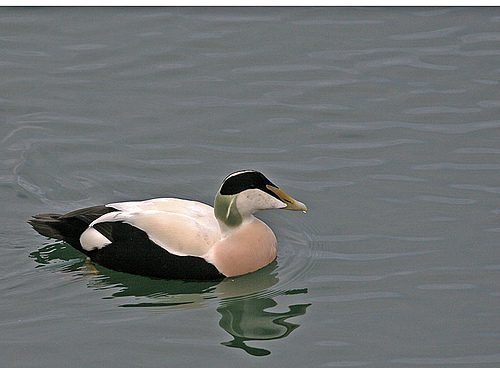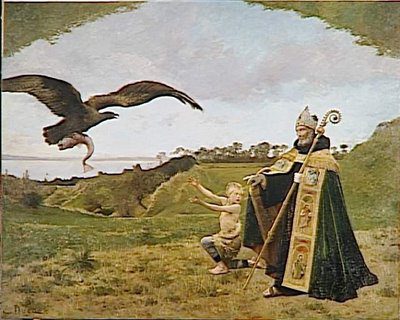Here is an account of the life of St. Cuthbert as told by The Venerable Bede. Cuthbert is a 6th century proto St. Francis figure, famed in his time as a miracle worker. Cuthbert was born in Northumberland circa 634. .. at various times in his life, Cuthbert was a monk, a hermit, and – briefly – a bishop. He lived in the Lindisfarne Abbey, and died there in 687.
(“The Venerable Bede” was born in 673, in Northumberland, considered a prominent intellect and one of the most prolific writers in this early Christian era).
The Farne Islands are an important locus for sea bird populations (including Pale-bellied Brent Goose, Wigeon, Teal, Pintail, Merlin, Dunlin, Bar-tailed Godwit). While resident there, St Cuthbert instituted special laws to protect the eider ducks and other seabirds nesting there, creating what may have been the first bird protection laws anywhere in the world. Consequently, eider ducks have long been known as ‘cuddy ducks’ (Cuthbert’s ducks) in the Pitmatic dialect as spoken in Northumberland.

“Many times birds and animals obeyed him. Once, fasting on a Friday till the late afternoon, as he was wont, a horse found him half a loaf of bread in the thatch of a house. He gave half of the bread to the horse and took the rest for himself. Another time, after he had prayed all night long in the sea, two sea-otters came to warm his feet and dry him with their fur; they received his blessing. Again, after fasting, a large fish was brought to him by an eagle. The fish was cut in two, half for the eagle, half for a family and himself. ‘Learn to have constant faith and hope in the Lord. He who serves God shall never die of hunger’, said Cuthbert. Another time, when he ordered birds who had come to eat barley he had sown to depart, they obeyed him. Ravens were reproved by him and then later brought him lard as a sign of their repentance. ‘What care should men not take to learn obedience and humility’, he said, ‘when even birds hasten to wash away their faults’.”
